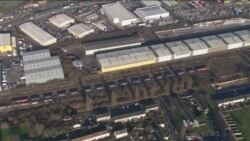The first-ever direct China-to-Britain freight train arrived in London last week.
It was the latest evidence of China’s efforts to redevelop the “Silk Road” trade routes that once stretched from Asia to Europe.
The train arrived in London after an 18-day, 28,000-kilometer trip. It traveled from China through Kazakhstan, Russia, Belarus, Poland, Germany, Belgium and France and then crossed under the English Channel. Inside the 68 containers were household goods, clothing, cloth, bags and suitcases.
Philippa Edmunds works at the British Campaign for Better Transport.
“This is twice as quick as sea, so it’s got an important role there. And, as I said, It’s much, much cleaner and cheaper than air freight -- I mean, it’s 20 times less pollution than air freight.”
But the train itself may be more important than the goods it was carrying. Observers say the trip had a political message: that China is developing new trade routes and new markets. Freight trains from China already bring goods to 15 European cities.
China needs to find more places to sell the goods it makes. That is the belief of Jie Yu of the London School of Economics.
“The domestic market in China now seems to be very much stagnated. So the Chinese (are) desperately looking for the new markets, and being able to absorb that excessive amount of production capacity. And obviously that freight train serves (as) a very good vehicle for the Chinese manufacturers and (may help) restore the business confidence inside China.”
Jie Yu says Chinese leaders believe they can use trade to gain more influence in the world.
“History opened a new era. And China has shown its willingness much more to shoulder more responsibility on the global stage and try to become a kind of responsible leadership.”
Another historic trip was taking place as the Chinese train arrived in London: Xi Jinping became the first Chinese president to attend the World Economic Forum in Switzerland. At the meeting, he spoke about the importance of globalization and free trade.
China’s government made strong statements in support of free trade and globalization in the days after Donald Trump became president of the United States. Trump says China’s trade policies have hurt the American economy. Some experts believe Xi’s words were an answer to the new president’s criticism of Chinese policies.
I’m Christopher Jones-Cruise.
Henry Ridgwell reported this story for VOANews.com. Christopher Jones-Cruise adapted his report into Learning English. George Grow was the editor.
We want to hear from you. Write to us in the Comments Section, or visit our Facebook page.
________________________________________________________________
Words in This Story
route – n. a way that someone or something regularly travels along
cheap – adj. not costing a lot of money; less expensive; less costly
stagnate – v. to stop developing, progressing, moving, etc.; to be or become stagnant
absorb – v. to take in and make (something) part of a larger group, country, etc.
capacity – n. the ability to hold or contain people or things (usually singular)
globalize – v. to make (something) cover, involve or affect the entire world; to begin to operate throughout the world





